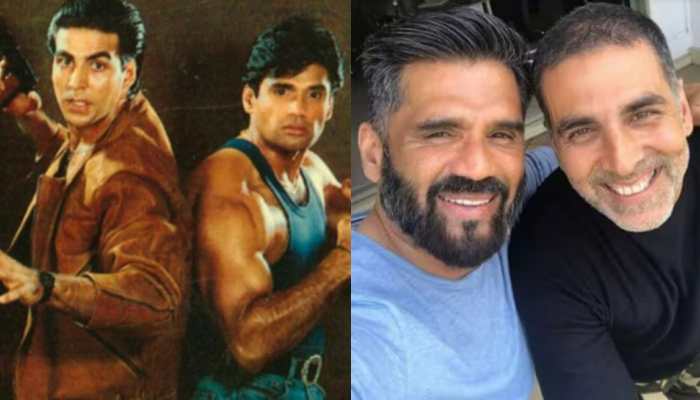Argentina playing safe for the greatest prize in the world
How well Argentina defend against Germany in the 2014 FIFA World Cup will decide the final match.
Trending Photos
)
 Jayanta Oinam
It`s a question rather droll. How well Argentina defend against Germany in the 2014 FIFA World Cup will decide the final match. Because, for a team built around the attacking brilliance of Lionel Messi, scoring seven goals in six games is not great, even if these numbers got the job done.
For the four-time World Player of Year, there were four goals for the self and the remaining three shared by Gonzalo Higuain, Angel di Maria and Marcos Rojo. Yes, there was an own goal from Bosnia and Herzegovina left-back Sead Kolasinac helping their cause.
Argentina have, in fact, won the first five of those six matches by a one-goal margin. In contrast, Germany have registered some convincing wins, including the semi-final rout of Brazil. The final, thus, will be against the German attack versus Argentine defence.
In the run up to the tournament, Alejandro Sabella`s team was considered one of the few teams having an intent of playing vibrant game. They scored an impressive 35 goals in their CONMEBO qualifiers, registering impressive wins over fellow World Cup teams - Colombia, Chile, Ecuador and Uruguay in the process.
Fabulous Four of Lionel Messi, Gonzalo Higuain, Angel di Maria and Sergio Aguero scored in bulks and the likes of Rodrigo Palacio, Ezequiel Lavezzi, Ever Banega (who didn`t find a place in the final World Cup squad) and Maxi Rodríguez also chipped in with odd goals. The presence of such attacking options provided Sabella the luxury of playing open games. And many have suspected their defence as the weak point, more in the line of a historical burden.
Despite arriving in Brazil as a defensively weaker team, Argentina emerged as one of the best defensive units in the tournament. Sabella`s team has survived three knock-out matches, which included two extra-time matches, without conceding a goal. In the heart of their defence is Javier Mascherano.
The Barcelona player found himself dropping back to support the central defenders in Martin Demichelis, Jose Maria Basanta and Ezequiel Garay; while fullbacks Pablo Zabaleta and Marcos Rojo quietly man the flanks, without ever compromising on their respective defensive duties. The presence of other defensive minded mid-fielders in Lucas Biglia and Fernando Gago have also provided an extra option to the team`s overall tactics.
Thanks to his proximity with the ball, Mascherano now plays as a pivot in the Argentine attack. He instigates most of the attacks after getting the ball off defensively dangerous areas. His performances against Belgium in the quarter-final and the Netherlands in the semi-final served as testimonials how important his role is in the current Argentine set-up.
Probably playing in his final World Cup, the 30-year-old former Liverpool player made the tackle of the tournament when he prevented Arjen Robben from taking a shot at the goal from a close distance in the semi-final. He followed the Dutch winger from outside the Argentine box and watched six, seven steps under intense pressure before finally producing a sliding tackle of perfect timing and accuracy.
Other defenders also did their job by not giving an inch to their rivals inside the defensive third. In fact, Holland who hammered defending champions Spain 5-1 in a group match, could manage only a single shot in the entire match. And the dangerous Robben got only four touches inside the Argentine half in the first half. The defensive duo of English champions Manchester City, Pablo Zabaleta and Martin Demichelis, has so far played indifferent roles for the country as both curbed their adventures up-front.
Up front the story is different. As evident from the score-lines, despite the presence of such finishers as Messi and Higuain in their ranks, Argentina suffer from bad finishing or the lack of it. Hampering their goal pursuit is the frequent change in the front-trio due to injuries. Kun Aguero, who continues his struggle with fitness, missed the knock-out matches. Then, the impressive Angel di Maria was forced to sit-out of the semi-final due to a muscle injury.
In their absence, the burden of scoring laid heavily on the out-of-form Higuan and Lavezzi. The withdrawn role of Messi further compounded Sabella`s worries. This was not the case, however, during the group stage as Argentina enjoyed domination in the attacking third. But in the three knock-out games, the South Americans visibly lacked the push.
In their quarter-final match against a free-flowing Belgian side, Argentina opted to play the waiting game, often withdrawing the ball from vantage points. Luckily for them, a moment of brilliance from Higuain early in the match saved a possible heartbreak.
Come July 14, Messi & Co. will once again be pitted against a disciplined German side, which massacred Brazilian hopes in Belo Horizonte. And despite the growing importance of Messi, the historic Maracana stadium in Rio de Janeiro will witness defenders dictating the course of the play.
Jayanta Oinam
It`s a question rather droll. How well Argentina defend against Germany in the 2014 FIFA World Cup will decide the final match. Because, for a team built around the attacking brilliance of Lionel Messi, scoring seven goals in six games is not great, even if these numbers got the job done.
For the four-time World Player of Year, there were four goals for the self and the remaining three shared by Gonzalo Higuain, Angel di Maria and Marcos Rojo. Yes, there was an own goal from Bosnia and Herzegovina left-back Sead Kolasinac helping their cause.
Argentina have, in fact, won the first five of those six matches by a one-goal margin. In contrast, Germany have registered some convincing wins, including the semi-final rout of Brazil. The final, thus, will be against the German attack versus Argentine defence.
In the run up to the tournament, Alejandro Sabella`s team was considered one of the few teams having an intent of playing vibrant game. They scored an impressive 35 goals in their CONMEBO qualifiers, registering impressive wins over fellow World Cup teams - Colombia, Chile, Ecuador and Uruguay in the process.
Fabulous Four of Lionel Messi, Gonzalo Higuain, Angel di Maria and Sergio Aguero scored in bulks and the likes of Rodrigo Palacio, Ezequiel Lavezzi, Ever Banega (who didn`t find a place in the final World Cup squad) and Maxi Rodríguez also chipped in with odd goals. The presence of such attacking options provided Sabella the luxury of playing open games. And many have suspected their defence as the weak point, more in the line of a historical burden.
Despite arriving in Brazil as a defensively weaker team, Argentina emerged as one of the best defensive units in the tournament. Sabella`s team has survived three knock-out matches, which included two extra-time matches, without conceding a goal. In the heart of their defence is Javier Mascherano.
The Barcelona player found himself dropping back to support the central defenders in Martin Demichelis, Jose Maria Basanta and Ezequiel Garay; while fullbacks Pablo Zabaleta and Marcos Rojo quietly man the flanks, without ever compromising on their respective defensive duties. The presence of other defensive minded mid-fielders in Lucas Biglia and Fernando Gago have also provided an extra option to the team`s overall tactics.
Thanks to his proximity with the ball, Mascherano now plays as a pivot in the Argentine attack. He instigates most of the attacks after getting the ball off defensively dangerous areas. His performances against Belgium in the quarter-final and the Netherlands in the semi-final served as testimonials how important his role is in the current Argentine set-up.
Probably playing in his final World Cup, the 30-year-old former Liverpool player made the tackle of the tournament when he prevented Arjen Robben from taking a shot at the goal from a close distance in the semi-final. He followed the Dutch winger from outside the Argentine box and watched six, seven steps under intense pressure before finally producing a sliding tackle of perfect timing and accuracy.
Other defenders also did their job by not giving an inch to their rivals inside the defensive third. In fact, Holland who hammered defending champions Spain 5-1 in a group match, could manage only a single shot in the entire match. And the dangerous Robben got only four touches inside the Argentine half in the first half. The defensive duo of English champions Manchester City, Pablo Zabaleta and Martin Demichelis, has so far played indifferent roles for the country as both curbed their adventures up-front.
Up front the story is different. As evident from the score-lines, despite the presence of such finishers as Messi and Higuain in their ranks, Argentina suffer from bad finishing or the lack of it. Hampering their goal pursuit is the frequent change in the front-trio due to injuries. Kun Aguero, who continues his struggle with fitness, missed the knock-out matches. Then, the impressive Angel di Maria was forced to sit-out of the semi-final due to a muscle injury.
In their absence, the burden of scoring laid heavily on the out-of-form Higuan and Lavezzi. The withdrawn role of Messi further compounded Sabella`s worries. This was not the case, however, during the group stage as Argentina enjoyed domination in the attacking third. But in the three knock-out games, the South Americans visibly lacked the push.
In their quarter-final match against a free-flowing Belgian side, Argentina opted to play the waiting game, often withdrawing the ball from vantage points. Luckily for them, a moment of brilliance from Higuain early in the match saved a possible heartbreak.
Come July 14, Messi & Co. will once again be pitted against a disciplined German side, which massacred Brazilian hopes in Belo Horizonte. And despite the growing importance of Messi, the historic Maracana stadium in Rio de Janeiro will witness defenders dictating the course of the play.Live Tv







)
)
)
)
)
)
)
)
)
)
